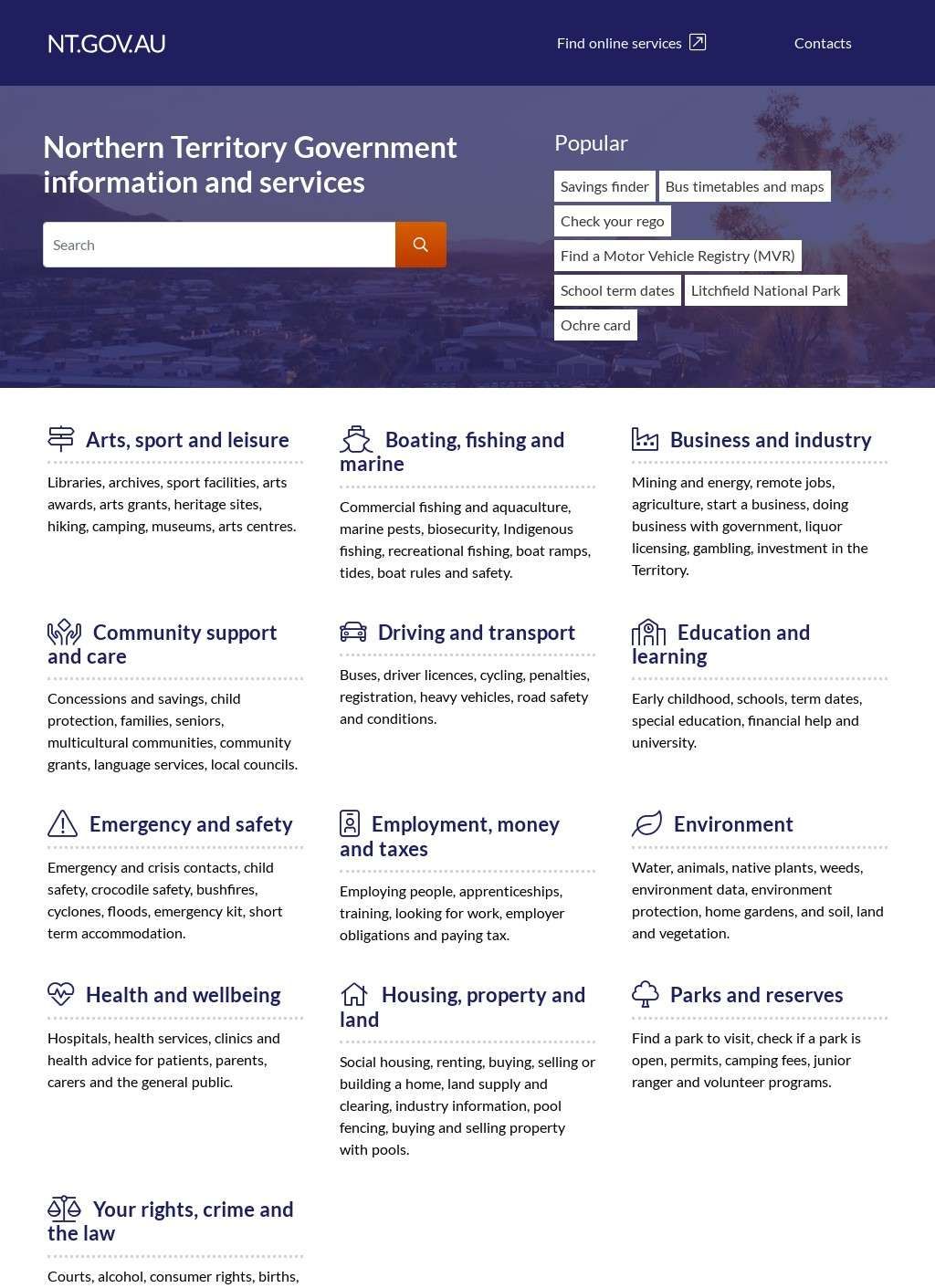The Northern Territory Government website represents one of Australia's most unique governmental digital platforms, serving a jurisdiction that functions simultaneously as a territory government and the primary local authority for most of its communities. Unlike other Australian states, the Northern Territory lacks separate local council structures across much of its vast territory, meaning this single government entity handles everything from municipal services to territory-wide policy implementation. This unusual arrangement creates both opportunities and challenges that show up throughout the website's comprehensive service offerings and community engagement approaches.
The platform's architecture reflects the Territory's distinctive geography and demographics, organizing services around the realities of governing a region larger than most countries but with a population smaller than many cities. Service categories span traditional government functions like health, education, and infrastructure alongside unique territorial challenges such as remote community support, indigenous affairs, and extreme weather emergency management. The website must serve everyone from Darwin's urban professionals to isolated cattle station families and remote Aboriginal communities scattered across hundreds of thousands of square kilometers.
Emergency services coordination takes on particular significance given the Territory's exposure to cyclones, flooding, bushfires, and extreme heat events that can isolate communities for extended periods. The emergency section provides real-time warnings, preparedness guidance, and response protocols tailored to Territory conditions. During crisis events like Cyclone Tracy's 50th anniversary commemorations, the website becomes central to community communication and recovery coordination, reflecting hard-learned lessons about disaster preparedness and response in remote regions.
Business and economic development services reflect the Territory's efforts to diversify beyond traditional mining and government employment. The website provides information about export opportunities, particularly in critical minerals and agricultural products, while supporting startup ecosystems and innovation programs. October Business Month represents a signature initiative connecting local entrepreneurs with national and international networks, demonstrating the government's commitment to economic diversification in a challenging but resource-rich environment.
Indigenous affairs receives substantial attention, reflecting the fact that Aboriginal and Torres Strait Islander peoples comprise roughly 30% of the Territory's population - far higher than national averages. Services include land rights administration, cultural heritage protection, and community development programs that acknowledge indigenous peoples' central role in Territory society. The website provides information about native title processes, sacred site protection, and bilingual education programs that respect traditional knowledge while providing contemporary opportunities.
Health services information acknowledges the unique challenges of delivering medical care across vast distances to sparse populations. The website includes information about Royal Flying Doctor Service coordination, remote area nursing programs, and specialist services that often require travel to Darwin or evacuation to southern capitals. Mental health resources receive particular attention, recognizing the isolation and stresses associated with remote Territory living.
Educational services cover the full spectrum from early childhood programs in remote communities to university partnerships and vocational training aligned with Territory industries. The website provides information about school of the air programs, residential college arrangements, and scholarship opportunities that help Territory students access educational opportunities despite geographic isolation. Adult education and community learning programs address the diverse needs of Territory residents, many of whom come from different cultural and linguistic backgrounds.
Environmental and sustainability initiatives reflect both Territory values and practical necessities in a region where environmental management directly affects community survival. Climate adaptation programs address real challenges like rising sea levels affecting coastal communities and changing rainfall patterns impacting agricultural communities. The website provides information about renewable energy programs, water security initiatives, and biodiversity conservation efforts that balance development needs with environmental protection.
Infrastructure development information covers major projects essential to Territory economic development, including port facilities, transportation networks, and telecommunications upgrades. The website tracks progress on initiatives like the Darwin shipping port expansion and rural road improvements that connect isolated communities to essential services. These projects often require coordination between Territory, Commonwealth, and private sector funding sources, creating complex approval and implementation processes.
Community engagement features demonstrate the Territory's commitment to inclusive decision-making despite the challenges of consulting across vast distances and diverse communities. The website includes consultation processes conducted through multiple languages and communication channels, recognizing that effective engagement requires more than standard public meeting approaches. Digital participation tools help overcome geographic barriers while ensuring that remote voices contribute to policy development.
The website maintains comprehensive contact information organized by region and service type, acknowledging that Territory residents often need to access services through multiple channels. Phone services include toll-free numbers essential for remote callers, while online services continue expanding to reduce the need for long-distance travel to government offices. Regional service centers provide local access points while maintaining connections to central administrative systems in Darwin.
Legislative and regulatory information reflects the Territory's unique constitutional position as a self-governing territory rather than a full state. The website explains how Territory laws interact with Commonwealth legislation while providing access to local regulations covering everything from liquor licensing to environmental protection. This legal framework affects everything from business operations to individual rights, making accurate information essential for Territory residents and businesses navigating complex jurisdictional arrangements.
